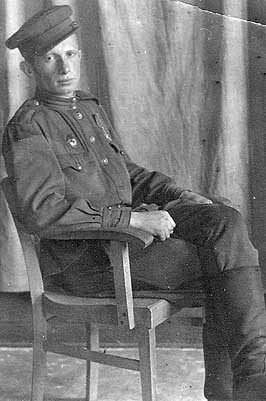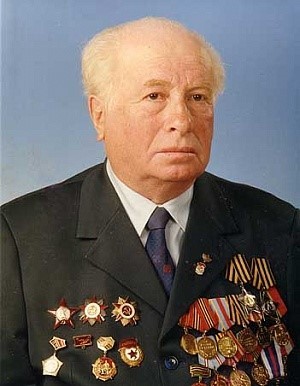Matvei Gershman was born in 1925 in Gomel, Belorussia, where he graduated from a 10-year school. Since he dreamed of becoming a military pilot in June 1941, he joined the Gomel aero-club. In order to be accepted Matvei altered his birth certificate to indicate that he had been born in 1923. As a result, all Gershman's military documents accept that as his birth year. A week after the Soviet-German war began Gershman reported to the local draft office to volunteer for combat, but he was told to wait until a special order was issued. On July 3, 1941 the local authorities, on an order of the State Defense Committee regarding the preservation of military reserves, assembled all local young men born between 1923 and 1926 at a suburban railway station and, then, had them march eastward, to central Russia. According to Gershman's recollection, many of the young draftees, especially Belorussian peasant boys, deserted on the way and returned home.1
After a series of adventures, Gershman and his peers arrived in Oriol, where those born in 1923 were assigned to military units, while the rest were sent to perform various kinds of labor. Gershman's comrades were sent to a tank school, but Gershman insisted that he wanted "to be a pilot and only a pilot!" His request was granted. With the parting words "So, pilot of ours, now go and learn how to be a Stalin falcon [figuratively – a good pilot]!", he was sent to Voronezh, presumably to a school of pilots. However, instead he ended up at a school for aircraft mechanics.
Gershman studied there for seven months, and then, with the rank of senior sergeant, he was assigned to an aircraft regiment deployed on the Briansk Front (in western Russia).
During the German offensive of the summer of 1942 Gershman was forced to retreat eastward together with the remnants of his regiment. Near Voronezh the Red Army stopped them and formed them into an anti-tank unit, which was ordered to halt a German tank offensive. At this point, as Gershman recalled, his love affair with aviation ended. After this battle, he and his comrades were sent to an infantry school. Senior Sergeant Gershman emerged as a gunner, specializing in the use of machine-guns anti-tank weapons.
He returned to the frontline, in Ukraine in August 1943. There Gershman was transferred to reconnaissance. According to him, the reconnaissance welcomed Jews: first, as Yiddish-speakers, they were believed to understand German and, second, people did not expect that Jews would surrender to the Germans. Gershman made 15 sorties across the frontlines and, inter alia, took ten German prisoners to gain information. In December 1943, still a senior sergeant, he was appointed the commander of a reconnaissance platoon. A short time later, as a former anti-tank gunner, he was ordered to stop an enemy tank column. Although he was wounded, he remained at his post as commander. After that, he spent four months in a military hospital. For his dedication he was awarded the Order of the Patriotic War.
In 1944, Gershman returned to the front. He fought in western Ukraine, Poland, and Germany. In July of that year, he took part in the liberation of the Majdanek death camp near Lublin in Poland. After that, he received his second military order.
Gershman recalled the operations in Germany as the hardest and most horrific stage of the war, with the German soldiers fighting on their own soil. At that point, he was fighting mainly as a sniper and he ascribed his survival in this capacity to a miracle. In January 1945, Gershman unexpectedly received letter from Gomel – his parents and two younger brothers were alive, having returned from evacuation.
In May 1945 Sergeant Major Gershman left the following signature on the walls of the Reichstag building: "Gershman from Gomel."
In the summer of 1945, Matvei Gershman was arrested for an "attempt on the life of an officer." He had threatened the officer with his rifle and even fired shots from his weapon over the officer's head. A military tribunal sentenced him to seven years imprisonment. Matvei's mother in Gomel found a good lawyer, who eventually succeeded in obtaining amnesty for her son. Gershman was released after three years in a prison camp in the Arctic and his military awards, which had been taken from him -- four orders and three medals – were returned to him.
In 1990, Gershman left the Soviet Union for Israel. He lives in Ashkelon and is active in the local chapter of the Committee of World War II Invalids.
From the interview given by Matvei Gershman in Israel in 2016
"On July 24 [1944] we approached Lublin. [… O]ur division was immediately sent to liberate the Majdanek death camp. The crematorium furnaces were still smoldering. We liberated a total of 1,200 prisoners, those whom the Germans did not have time to finish off. There were thousands of corpses ... The barracks were long and painted green. There were warehouses of clothes, hair, chemicals ... Skeletons covered with skin lay on the ground [...] I looked at this whole nightmare, and thought about my family, from July 1941. I did not know what happened to them, whether they were alive or had perished in a ghetto. Three days before the liberation of the concentration camp, we captured a Vlasovite [soldier of the collaborationist Russian army that fought on the German side]. As a rule, we finished them off on the spot. This one was a very young lad. I said the soldiers: "Take him prisoner but don't harm him..." When I found myself standing near one of the crematoriums, I regretted my benevolence. About two days later we scoured the camp and its surroundings and finished off any SS guards [we found]."
…"I did not encounter any outright antisemitism. I had a comrade who liked to say as if he were joking: 'Matvei, you are the only Jew sitting in the trenches'. I immediately began to boil and said 'Take a look around. Next to us there is the regimental battery commanded by [the Jew] Kaufman, there is a platoon commander in our battalion named Katz, and a gunner named Berman, if I remember his name correctly. My comrade shook with laughter, satisfied that he had gotten my goat. But I don't recall any time when I was discriminated against in the army because of my point five [ethnicity as listed in Soviet identity papers]. Perhaps when it was out of my hearing, someone said [something derogatory], but in my presence - never. Most of the soldiers were Slavs, and there were always many soldiers from the Central Asian republics in the infantry. There were also many Tatars and Bashkirs ... On the frontlines no one cared about your religion, nationality, etc. Besides, we didn't have any time to talk about such things. We just thought about surviving until the next morning and about a rye rusk and a pot of concentrated pea soup."
From iremember.ru
- 1. An interview given by Matvei Gershman in Israel in 2016








